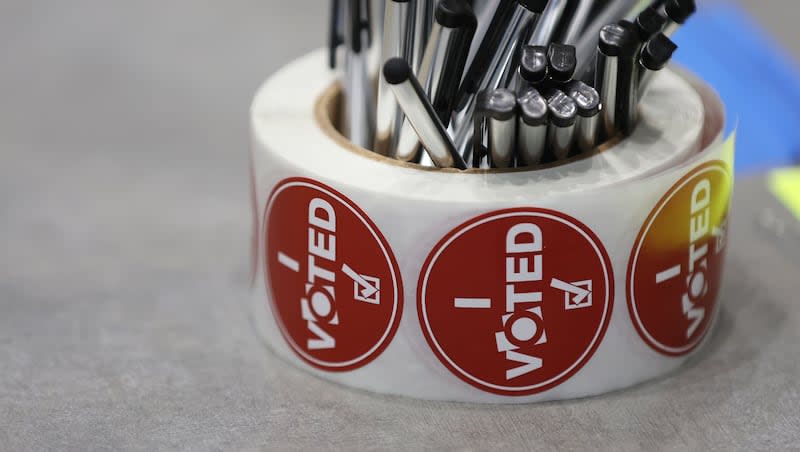The future of ranked choice voting in Utah divides Senate leadership

- Oops!Something went wrong.Please try again later.
- Oops!Something went wrong.Please try again later.
The fate of Utah’s run with ranked choice voting divided Senate leadership Monday morning.
During the senate committee for HB290, Senate President Stuart Adams, R-Layton, voted with the majority to repeal the state’s alternate voting methods pilot project, saying he “wasn’t impressed” with the results of ranked choice voting in the cities where it was tested.
Senate Majority Leader Evan Vickers, R-Cedar City, joined two Democratic colleagues in opposing the measure, arguing that cities deserved the opportunity to opt in during the next year-and-a-half before the program’s original sunset date.
The disagreement between the Senate’s two most powerful members reveals a break among Utah’s majority caucus over the virtues of ranked choice voting, local control of elections and the state of voter confidence.
“My personal opinion is having seen it run, I haven’t been impressed with the outcomes, quite frankly,” Adams told the Deseret News on Monday. “When you’re voting for your fourth or fifth choice, and you don’t even know who the people are, and they haven’t had a chance to vet them and they become the elected official, I don’t think it’s great policy.”
Others, including Vickers, argue the point of the pilot program was to let cities experiment with ranked choice voting and to gather as much data as possible to make a decision on whether to leave the option open to cities indefinitely.
Vickers told the Deseret News he doesn’t have a strong opinion on the policy of ranked choice voting one way or the other but believes that “the cities still ought to have a choice for another couple of years.”
Bill sponsor Rep. Katy Hall, R-South Ogden, said the disagreement among party members, which was also evident during the House committee hearing and floor debate, boils down to the occasionally competing values of local control and trust in democratic institutions.
“I think the devision just comes where there’s people who feel that local control is the thing, which I am totally for local control, except in this case,” Hall said. “I feel like elections need to be straight across the board for the state.”
Hall repeated what she has said on numerous occasions that the pilot program — which passed with nearly unanimous legislative support in 2018 — was well-intended. But having seen, among other things, voter confusion in Moab, recount troubles in Sandy and a cluttered candidate field in Lehi, she believes state lawmakers can’t afford to let the program run its course.
“I’m glad we did the trial,” she said. “But it doesn’t appear to be having the intended consequences. And so it just doesn’t make sense to me to go even one more municipal cycle with that way of voting when it’s already causing so much confusion.”
The bill would change the repeal date for Utah’s six-year-old ranked choice voting pilot program from Jan. 1, 2026, to May 1, 2024. This would return the state to a uniform standard of traditional voting for municipal elections in 2025, eliminating one additional election cycle where Utah municipalities would have been allowed to opt into the program.
HB290 passed the House on Feb. 22 with 43 yeas and 26 nays, and exited the Senate committee on government operations with a 5-3 vote on Monday.
Over the last three municipal election cycles, dozens of Utah cities have tried the electoral system which asks voters to arrange candidates in order of preference on their ballot, instead of just selecting one. If no candidate receives a majority of first-preference votes during the tabulation process, then the lowest vote-getter is eliminated and ballots are redistributed based on subsequent rankings until a candidate receives a majority.
Multiple surveys have found the majority of Utah voters who used ranked choice voting like it, find it easy to understand and want to see it used in future municipal elections.
The voting method has been touted as a way to eliminate plurality outcomes in elections, give voters more nuanced options and incentivize campaigns that are geared toward securing broad electoral support. But some elected officials in jurisdictions where ranked choice voting has been implemented worry it could increase political tension as decades of precedent are upset leading to greater distrust in elections.
Despite disagreement among top-ranking senators, who often have the final say over what bills make it to the floor for a full senate vote, Hall said she’s hopeful legislative leadership will prioritize the bill’s passage during a time when concerns over election integrity have reached a polarized boiling point.
“I’m hopeful that there is just a feeling to just be done and let’s get some election confidence back into our Utah voters and and go on from there,” Hall said.
The legislative session ends Friday, March 1, at midnight.

